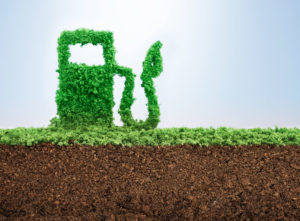New cars are packed full of technological advances and finely calibrated equipment that helps increase fuel efficiency, saving you cash at the gas pump. But if you have an older car, especially a classic car, your ride may not have the latest engine technology for maximum fuel economy. Fret not, there are still plenty of DIY ways to improve fuel efficiency in older cars.
5 Ways to Improve Fuel Efficiency in Older Cars
You’ve probably heard the standard mileage-boosting advice of reducing the amount of weight in your car, turning your car off instead of idling in traffic, and keeping the air conditioning off as much as possible. Here are 5 ways to improve fuel efficiency in older cars.
1. Use High-Quality Gasoline
 The benefits of high quality gasoline aren’t a myth. Using higher quality gasoline can reduce the amount of knock – or explosions in the combustion chamber that are unregulated – that occurs in your engine.
The benefits of high quality gasoline aren’t a myth. Using higher quality gasoline can reduce the amount of knock – or explosions in the combustion chamber that are unregulated – that occurs in your engine.
In addition, higher quality gasoline burns more cleanly and slows the rate of carbon buildup within the engine. Many premium fuels contain additives that further help to prolong the life and efficiency of the fuel system.
If nothing else, adding fuel injection cleaners help keep intake valves free from buildup. Some brands of fuel injection cleaners lubricate the engine’s cylinders to help keep the engine running smoothly.
2. Replace the Gas Cap
The gas cap is something that is easy to forget about until it’s time to fuel up, but this small part helps keep your car running normally by keeping fuel from evaporating too quickly, and by preventing road dirt and dust from contaminating the fuel supply. In fact, a loose or broken gas cap can cause your vehicle to fail an emissions test.
Replacing the gas cap on an older vehicle every couple of years helps you ensure that your gas tank has a tight seal, which in turn makes sure your car isn’t needlessly losing fuel to evaporation.
3. Consider Upgrading Vehicle Parts
While upgrading parts on classic cars is out of the question for some people, certain components can help boost your vehicle’s efficiency.
 Air-ride suspensions can improve your car’s fuel efficiency by lowering your vehicle’s profile, which improves air displacement when you’re traveling down the road.
Air-ride suspensions can improve your car’s fuel efficiency by lowering your vehicle’s profile, which improves air displacement when you’re traveling down the road.- If you’re really serious about maximizing your vehicle’s fuel efficiency and lifespan at the same time, you can always have the engine and transmission rebuilt, effectively modernizing your engine.
- You can also purchase tires that reduce the rolling resistance, which means less strain is put on the engine, and in turn, less fuel is burned to maintain cruising speed.
4. Perform Routine Maintenance Regularly
Whether your car is new or old, routine maintenance maximizes the lifespan of your vehicle. Replace your spark plugs, oxygen sensor, and air and fuel filters, all of which contribute to a longer vehicle lifespan. Combined, these components help ensure that your car uses the optimal mixture of air and fuel for proper operation as well as help the engine burn fuel more efficiently.
5. Keep Your Tires in Top Shape
Inflated properly, your tires help your car saves fuel by reducing the amount of power needed to turn a single rotation. That means less drag and strain, which translates to savings at the pump.
Older Car Repairs at T3 Atlanta
While old cars may never be as fuel-efficient as newer vehicles, there’s still a lot you can do to improve the fuel economy in these classics. When you need your older Toyota, Lexus, Nissan, or Infiniti repaired, call T3 Atlanta. We have two convenient locations in the metro Atlanta area and can help your old car run like new again.










Leave a Reply
You must be logged in to post a comment.